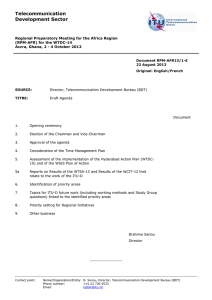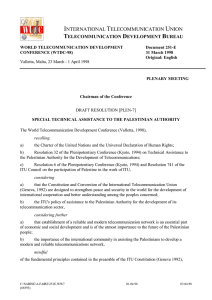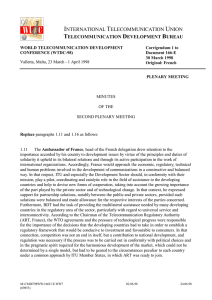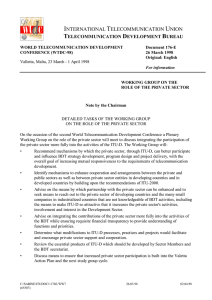I T U D
advertisement
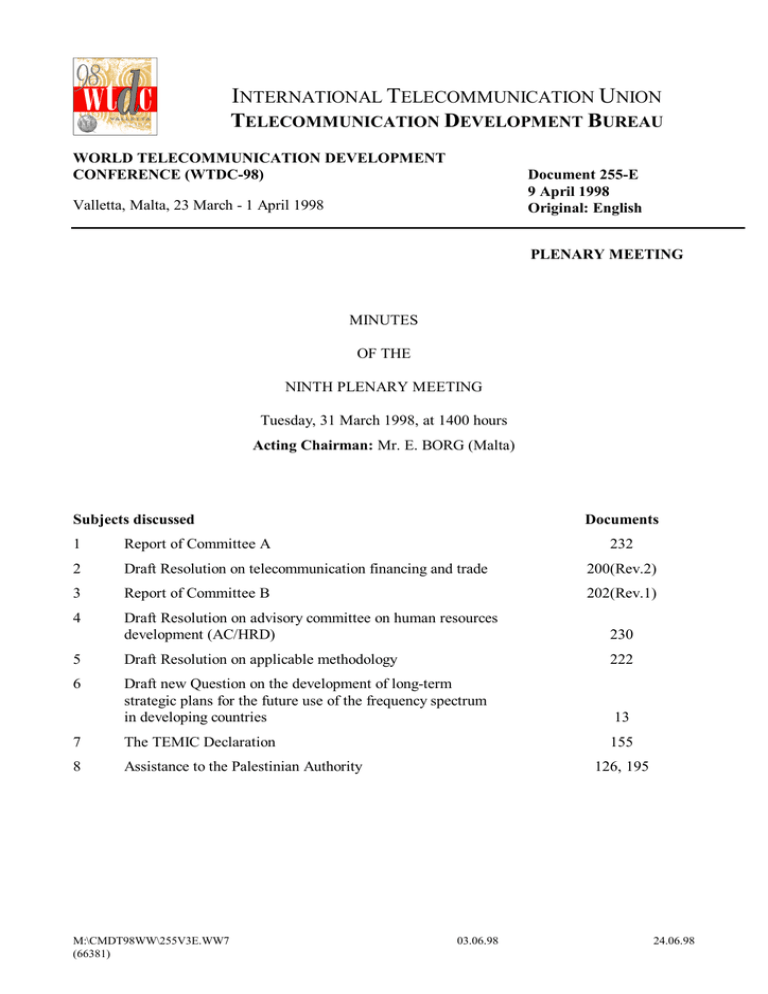
I NTERNATIONAL TELECOMMUNICATION UNION TELECOMMUNICATION DEVELOPMENT BUREAU WORLD TELECOMMUNICATION DEVELOPMENT CONFERENCE (WTDC-98) Document 255-E 9 April 1998 Original: English Valletta, Malta, 23 March - 1 April 1998 PLENARY MEETING MINUTES OF THE NINTH PLENARY MEETING Tuesday, 31 March 1998, at 1400 hours Acting Chairman: Mr. E. BORG (Malta) Subjects discussed Documents 1 Report of Committee A 2 Draft Resolution on telecommunication financing and trade 200(Rev.2) 3 Report of Committee B 202(Rev.1) 4 Draft Resolution on advisory committee on human resources development (AC/HRD) 230 5 Draft Resolution on applicable methodology 222 6 Draft new Question on the development of long-term strategic plans for the future use of the frequency spectrum in developing countries 13 7 The TEMIC Declaration 155 8 Assistance to the Palestinian Authority M:\CMDT98WW\255V3E.WW7 (66381) 232 126, 195 03.06.98 24.06.98 -2CMDT98/255-E 1 Report of Committee A (Document 232) 1.1 The Chairman of Committee A, introducing his report in Document 232, said that two sub-committees had been established to examine telecommunication development policies and strategies. Those related to national structures and sector reform had been considered by SubCommittee A/1, and those related to financing, economics and partnerships, by Sub-Committee A/2. The Committee had adopted four Recommendations and nine new Questions for the period 19982001. Unfortunately the Committee had not had time to consider in depth the contribution by Brazil in Document 11 concerning the role of enterprise incubators in promoting the growth of small and medium enterprises, and he therefore suggested that the Director of BDT and the Chairman of the Working Group of the Plenary on the Valletta Action Plan should consider incorporating a reference to that important contribution in the Conference output documents. An important document submitted by Syria had likewise been before the Committee (Document 33) but time had been too short for it to be discussed. He thanked all participants in the Committee’s difficult work as well as the Secretariat of ITU and the Director of BDT. 1.2 The Acting Chairman commended the Chairman of Committee A and all those who had collaborated with him in the excellent work done by the Committee. 1.3 The representative of Brazil said that the paper on enterprise incubators in Document 11 was of great importance to developing countries and had received substantial support. He proposed that it be included in Programme 5 of the Valletta Action Plan. 1.4 The Acting Chairman observed that there was full support for that proposal, which he requested the Working Group on the Valletta Action Plan to note. 1.5 The report of Committee A was approved. 2 Draft Resolution on telecommunication financing and trade (Document 200(Rev.2)) 2.1 The Chairman of Committee A, introducing the draft Resolution on telecommunication financing and trade in Document 200(Rev.2), pointed out that the annex thereto was drawn from Annex 4 to the report in Document 82 on the World Telecommunication Policy Forum. Committee A had been in full agreement on the content of the document, although several drafting problems had remained unresolved. A drafting group chaired by the representative of France had been asked to work on those problems and had done an excellent job of preparing the text now before the Plenary. The text set out a number of important considerations, including some of relevance for the forthcoming Plenipotentiary Conference. 2.2 The representative of France, speaking as chairman of the drafting group, said that the text before the Plenary incorporated numerous drafting changes, including some put forward by Jamaica, and it reflected the compromise reached at the drafting group's latest meeting. 2.3 The representative of Spain, supported by the representatives of Colombia, Mexico, Tanzania and Syria, proposed that in considering a),"in its commercial aspect" should be inserted after "in particular". That would clarify the exact nature of the change in the telecommunication environment as a result of the WTO basic telecommunication agreement and the General Agreement on Trade in Services (GATS). He also noted in respect of the phrase "telecommunication industry" that the Spanish language version should be aligned with the English. 2.4 The representative of Syria, referring to section II, paragraph 3, of the annex to the draft Resolution, said that he understood the phrase "other relevant regional groups" to be a reference to M:\CMDT98WW\255V3E.WW7 (66381) 03.06.98 24.06.98 -3CMDT98/255-E the Arab regional tariff group. That group, which was not a group within ITU, was made up exclusively of Arab administrations. The TEUREM group, on the other hand, comprising eight Arab Administrations and 42 European Administrations, was not active at present. 2.5 The representative of Saudi Arabia fully agreed with those comments concerning the regional groups: the matter would have to be considered carefully in future. He supported the draft Resolution and the amendment proposed by Spain. 2.6 The representative of Mali drew attention to a number of typographical errors and suggested certain editorial amendments, and the representative of France explained that the French and Spanish language versions would have to be aligned with the original, English text. 2.7 The Acting Chairman, supported by the representatives of the United States and Argentina, suggested that the meeting approve the draft Resolution subject to alignment of the different language versions and incorporation of the amendment proposed by Spain. 2.8 It was so agreed. 2.9 The draft Resolution on telecommunication financing and trade, as amended, was approved. 3 Report of Committee B (Document 202(Rev.1)) 3.1 The Chairman of Committee B introduced the report of his Committee in Document 202(Rev.1) and said the Committee was proposing seven draft Resolutions and two draft Recommendations for approval and the attribution of eight activities to Programmes 2, 3 and 6 of the Valletta Action Plan. He thanked the Committee’s vice-chairmen, the Secretariat, and the experts and other participants who had made important contributions to the Committee’s work. 3.2 The report of Committee B was approved. 4 Draft Resolution on advisory committee on human resources development (AC/HRD) (Document 230) 4.1 The Chairman of Committee B, introducing Document 230, said that the Committee had agreed in principle with the establishment of an advisory committee on human resources development, but the terms of reference needed further discussion. 4.2 The representative of Lebanon, speaking as the Chairman of the ad hoc Group of Committee B, said that within the Group a consensus had been reached on the terms of reference of the Advisory Committee, as set out in Annex A to Document 230. He thanked all participants who had contributed to the work of the Group. 4.3 The representative of Jamaica said that although he would not block a consensus, he questioned the validity of establishing the advisory committee. He was concerned that the creation of too many mechanisms might detract from the sharp focus that should be given to work under the Valletta Action Plan. The advisory committee was envisaged, not as a committee specifically answerable to the membership of ITU, but as a group that would apparently be open to any human resource development experts wishing to participate, who would provide advice to the Director of BDT. Every effort was to be made to ensure balanced representation and due consideration was to be given to regional requirements and relationships. But due consideration was not enough: human resource development must be rooted in national and regional experience. Everyone agreed on the M:\CMDT98WW\255V3E.WW7 (66381) 03.06.98 24.06.98 -4CMDT98/255-E paramount importance in the period 1998-2001 of ensuring that developing countries acquired for themselves the necessary human, institutional and regulatory infrastructure rather than continually looking elsewhere for assistance. 4.4 The representative of Italy agreed on the need to prevent the proliferation of bodies providing advice to the Director of BDT. 4.5 The representatives of Cameroon, Barbados, Suriname, Guinea, Brazil and Mali opposed any duplication of efforts but were nevertheless in favour of continuing to seek ways of meeting the training needs of developing countries. They considered that the draft Resolution should be revisited after further revision. 4.6 The representative of Russia said that the draft Resolution would create a further unnecessary body and might entail supplementary expenditures. 4.7 The representative of Lebanon said that there would be no financial implications in the creation of the committee, for it would take over the relevant work and the budgetary allocations of the study groups under Questions 2/2 and 5/2. 4.8 The representative of Niger having drawn attention to the need to align the different language versions in respect of § 5 of Annex A, the Acting Chairman observed that there seemed to be no consensus on the draft Resolution at present, although the underlying principle was deemed to be laudable. He therefore suggested that the text be revised by the ad hoc Group for consideration by a subsequent Plenary meeting. 4.9 It was so agreed. 5 Draft Resolution on applicable methodology (Document 222) 5.1 The representative of Lebanon, introducing the draft Resolution in Document 222, said that in the English version of decides c), the phrase "total public services" should be replaced by "telecommunication services which are totally public". 5.2 The draft Resolution conveyed specific messages to the administrations of developed and developing countries and to private sector entities. To administrations of developing countries, it indicated that, while liberalization sometimes had adverse economic consequences, on the whole it represented a chance to develop the telecommunication sector, which could serve as an essential economic vehicle. The developing countries could no longer operate under a structure in which the government was involved in all decisions concerning day-to-day operations, personnel management, recruitment, promotion and salary scales. Managers must be given the autonomy to operate according to the criteria of the private sector and the freedom to administer their human and financial resources. To administrations of developed countries, the draft Resolution spoke of the need to take account of the fundamental concerns of the developing countries, on whom globalization of the telecommunication sector imposed rapid and painful changes. The development of de facto monopolies must be prevented. The play of market forces would yield the desired results in the end, but the price was too high to pay for many developing countries. A culture of cooperation between developed and developing countries should be fostered. To private operators, the draft Resolution offered an investment opportunity and pledged that no new constraints would be placed on freedom of investment. It invited direct and open financial commitments, as opposed to bilateral offers of dubious validity, and it advocated free competition. The decides portion of the draft Resolution aimed at accelerating the process of liberalization while proposing an assistance M:\CMDT98WW\255V3E.WW7 (66381) 03.06.98 24.06.98 -5CMDT98/255-E mechanism in the form of a fund. It avoided using the word "sanctions", which had been deemed inappropriate in earlier versions. 5.3 The representative of Saudi Arabia endorsed the draft Resolution, which covered a matter of pressing concern to the developing countries, although he recognized that the mechanisms for establishing and operating the private fund proposed in decides c) would require further study. The representative of Cameroon supported that position. 5.4 The representative of the United States said that her experience with similar funds at the national level indicated that the operation of such a fund was a complex matter and would require further detailed study before its establishment could be approved. 5.5 The representative of Mali supported the draft Resolution in principle but suggested that decides a) should be amended by deleting the worlds "in all possible ways". The mechanisms for the proposed fund should perhaps receive further consideration and Document 44, which addressed funding for the development of telecommunications in rural and remote areas, might prove useful in that regard. 5.6 The representative of Bulgaria also supported the draft Resolution in principle. However, the rules for managing and utilizing the proposed fund should be set out before its establishment could be approved. Moreover, the proposed fund was only one means of financing the liberalization of telecommunication services. All possible options should be explored before any decision was taken. The representatives of Switzerland, Mexico, Norway and the Netherlands supported that view. 5.7 The representative of GTE said that, as a private sector member, he could not envisage contributing to the proposed fund unless he knew precisely how it would be established, operated and monitored. There should be a good understanding of and agreement on those matters before he could support the draft Resolution. 5.8 The representative of Zimbabwe also supported the draft Resolution in principle and agreed that further study of the proposal was needed. An alternative would be to amend decides c) to the effect that the private sector should be encouraged to participate in WorldTel; invites c) would need to be amended accordingly. The representative of Tanzania supported that view. 5.9 The representative of Kenya joined previous speakers in expressing concern about decides c) and suggested that estimating a)-d) and invites BDT a) required further explanation. 5.10 The representative of Cape Verde said that a compensation fund had been established in her country to improve telecommunication access which might prove an obstacle to Cape Verde's acceptance of the fund proposed in the draft Resolution. 5.11 The Director of BDT said that a distinction should be drawn between the financing of technical assistance and that of investment, for example to achieve universal access. Moreover, he suggested that it might not be necessary to establish a new fund since a number of financing mechanisms already existed, including: the Special Voluntary Programme for Technical Cooperation, governed by Resolution 28 (Kyoto, 1994); WorldTel, which had already been mentioned; and local national, subregional and regional funds. A feasibility study of possible financing mechanisms for the transition to a liberalized telecommunication market in developing countries might be the best option at the present time. M:\CMDT98WW\255V3E.WW7 (66381) 03.06.98 24.06.98 -6CMDT98/255-E 5.12 The representative of Niger said that, while it would be difficult to achieve consensus on the draft Resolution in its present form, there was considerable agreement on much of its content. Perhaps it might prove acceptable with the deletion of decides c). 5.13 The Acting Chairman considered that the strength of opposition to the draft Resolution would make agreement unlikely. He therefore proposed that BDT be requested to undertake a feasibility study to determine the best way forward. 5.14 It was so agreed. 6 Draft new Question on the development of long-term strategic plans for the future use of the frequency spectrum in the developing countries (Document 13) 6.1 The representative of the United Kingdom drew attention to the annex to Document 13 which set out a draft new Question [G-WTDC-1] on a draft work plan for the development of a long-term strategy for the future use of the frequency spectrum in developing countries. He recalled that in Committee B it had been suggested that the matter would best be considered in ITU-R. A drafting group had therefore prepared a draft Resolution, the text of which would be available shortly, recommending that ITU-R should consider undertaking an appropriate study. 6.2 The representative of Japan, supported by the representative of Jamaica, said that the question of future use of the frequency spectrum in developing countries was related to development issues and should also be taken up in ITU-D, although he recognized that any decision on the subject would have to be taken at a world radiocommunication conference. It would be important to ensure that the outcome of any studies on the matter undertaken in ITU-D were transmitted to ITU-R. 6.3 The Acting Chairman, supported by the representatives of Tunisia and Mali, proposed that the discussion should be deferred, pending the availability of the draft text. 6.4 It was so agreed. 7 The TEMIC Declaration (Document 155) 7.1 The representative of TEMIC said that the Telecommunications Executive Management Institute of Canada (TEMIC) was a unique partnership between the public and private sectors and its alumni; its mandate was to assist telecommunication organizations from developing countries in expanding their capacity for future development. Since its establishment in 1986, it had collaborated with BDT in providing fellowships for 994 trainees, 117 of whom were women, from 124 countries. Many of its graduates were now working at senior levels in telecommunication organizations around the world. TEMIC's experience had shown that the challenges posed by technology and financing in telecommunications could only be successfully addressed by properly trained and motivated managers implementing appropriate policies. A summit meeting of TEMIC graduates had been held in Gozo immediately prior to WTDC-98, in which Sir Donald Maitland and the Director of BDT, among others, had participated. The outcome of that meeting, the TEMIC Declaration, was set out in Document 155. It made a number of recommendations to ITU-D which he hoped would receive favourable consideration. A report on the summit meeting was also in preparation. 7.2 The representative of Barbados, expressing appreciation for the benefits of TEMIC fellowships, endorsed the TEMIC Declaration. She suggested that it should be mentioned in the M:\CMDT98WW\255V3E.WW7 (66381) 03.06.98 24.06.98 -7CMDT98/255-E Valletta Declaration. The representative of Cape Verde also endorsed the Declaration. She commended the excellent training provided by TEMIC, especially for women. 7.3 The Chairman of the Working Group of the Plenary on the Valletta Action Plan suggested that an appropriate reference to the TEMIC Declaration could be inserted in the Valletta Declaration and Action Plan when they were discussed in Plenary. 7.4 It was so agreed. 8 Assistance to the Palestinian Authority (Documents 126 and 195) 8.1 The representative of Saudi Arabia, introducing Document 195, said that assistance to the Palestinian Authority had been the subject of a number of important ITU decisions in the past. Document 195 set out the concern of a number of countries and their strong opposition to Document 152 which did not respect those decisions. It also set out a number of requests whose legitimacy he wished to affirm and fulfilment of which was vital for Palestinian telecommunication development. 8.2 The representative of Israel, saying that he wished to respond to the statement made by the Head of delegation of the Observer of the Palestinian Authority at the third Plenary Meeting and to Documents 4, 93, 126 and 195, recalled that Israel and PLO were parties to the interim agreement on the West Bank and Gaza Strip of 28 September 1995, which set out the agreed arrangements for the exercise of powers and responsibilities by the Palestinian side during a five-year interim period. The agreement provided a wide range of opportunities for the growth and development of Palestinian telecommunications and a comprehensive and detailed framework for the areas under Palestinian civilian control. Nonetheless, it clearly stated that the Palestinian side was currently permitted to undertake international communications (cable, wireless, broadcasting and satellite) exclusively through Israeli infrastructure. The agreement also provided for ongoing coordination and cooperation between the two parties, including the assignment of frequencies to the Palestinian side, through a Joint Technical Committee which met several times a year. All the current telecommunication arrangements had been agreed upon by the two parties within the framework of the interim agreement. Any attempt by either party unilaterally to alter this framework or to invite international forums to act in a manner that would lead to such alteration could only serve to undermine progress in the peace negotiations. Israel opposed the submission of a "country paper" by the Ministry of Posts and Telecommunications of the Palestinian Council (Document 93). Israel's position in that regard was set out in Document 231 which would be distributed shortly. Israel regretted the attempt to politicize the work of WTDC-98 and BDT as evidenced by Document 195, and opposed any draft resolution, recommendation or other expression of intent which ran counter to its expressed position regarding the assignment of an international code, independent registration of frequencies and obtaining of call signs by the Palestinian Authority or any change in the current observer status of PLO within ITU. Palestinian telecommunication development was taking place thanks to effective cooperation under the interim agreement and with ongoing technical assistance from BDT in accordance with Resolution 32 (Kyoto, 1994). In Resolution 4 (AR-RTDC-96), set out in Annex 1 to Document 4, the requests the Secretary-General and the Directors of the BR and TSB to continue to give consideration to the above matters went beyond the competence and authority of ITU and its forums. Any consideration by ITU of those matters was likely to prejudice the outcome of bilateral negotiations between the parties concerned and thereby undermine prospects for peace. Israel hoped to continue the positive and professional working relationship existing between itself and the Palestinian Authority in the area of telecommunications within the framework of the Joint Technical Committee. M:\CMDT98WW\255V3E.WW7 (66381) 03.06.98 24.06.98 -8CMDT98/255-E 8.3 The representative of Tunisia, introducing Document 126, said that Resolution 32 (Kyoto, 1994) clearly stated the need for assistance to the Palestinian Authority in information, informatics and communication. Despite the combined efforts of ITU-D and UNESCO, Palestinian telecommunication services had not developed as expected, and further technical and financial assistance was clearly needed. The accession of the Palestinian Authority to membership of ITU would facilitate the implementation of ITU-D programmes and structured telecommunication development. He therefore called for urgent consideration of the question of accession in the appropriate forum. He further recommended that consideration should be given by WTDC-98 to the allocation to the Palestinian network of an international country code and to recognition of the Palestinian Authority's right to manage and control frequency spectrum, which would also further Palestinian telecommunication development. 8.4 The representatives of Lebanon, Comoros and Mali supported these views, stressing the development aspects of the proposed assistance. 8.5 The observer for Palestine endorsed Documents 195 and 126 which addressed the urgent economic needs of the Palestinian people. While he recognized that the question of accession to membership of ITU was not within the competence of WTDC-98, he supported the representative of Tunisia's call for the Conference to give urgent consideration to allocating the Palestinian network an international country code and to recognition of the Palestinian Authority's right to manage and control frequency spectrum, matters which were crucial to the successful planning and development of telecommunications and to the overall development of Palestinian territories. 8.6 The representative of Syria supported additional assistance to the Palestinian Authority along the lines proposed and he called for WTDC to endorse Resolution 4 (AR-RTDC-96). 8.7 The representative of the United States regretted the submission of Documents 195 and 126 to WTDC-98 and joined the representative of Israel in opposing those documents and the endorsement of Resolution 4 (AR-RTDC-96). The Conference was limited to providing guidance to BDT on technical questions only. ITU was a technical body and should not consider political matters. 8.8 The representative of Saudi Arabia welcomed the support expressed for additional assistance to the Palestinian Authority. He urged the Conference to support the allocation of an international country code and recognition of the Palestinian Authority's right to manage frequency spectrum, and to call on the Secretary-General to study the proposed accession of the Palestinian Authority to ITU membership, with a view to consideration of such accession by the forthcoming Plenipotentiary. The meeting rose at 1815 hours. The Secretary: H. PIETERSE M:\CMDT98WW\255V3E.WW7 (66381) The Acting Chairman: E. BORG 03.06.98 24.06.98
